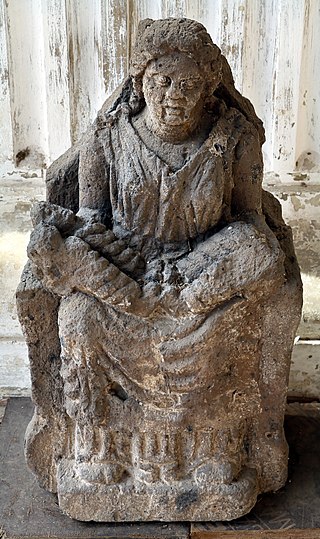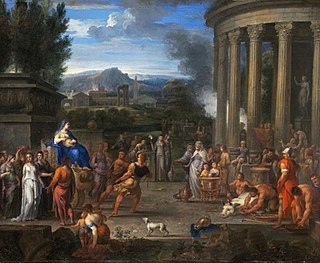Related Research Articles
Year 491 BC was a year of the pre-Julian Roman calendar. At the time, it was known as the Year of the Consulship of Augurinus and Atratinus. The denomination 491 BC for this year has been used since the early medieval period, when the Anno Domini calendar era became the prevalent method in Europe for naming years.

Venus is a Roman goddess, whose functions encompass love, beauty, desire, sex, fertility, prosperity, and victory. In Roman mythology, she was the ancestor of the Roman people through her son, Aeneas, who survived the fall of Troy and fled to Italy. Julius Caesar claimed her as his ancestor. Venus was central to many religious festivals, and was revered in Roman religion under numerous cult titles.

Vesta is the virgin goddess of the hearth, home, and family in Roman religion. She was rarely depicted in human form, and was more often represented by the fire of her temple in the Forum Romanum. Entry to her temple was permitted only to her priestesses, the Vestal Virgins. Their virginity was deemed essential to Rome's survival; if found guilty of inchastity, they were buried or entombed alive. As Vesta was considered a guardian of the Roman people, her festival, the Vestalia, was regarded as one of the most important Roman holidays. During the Vestalia privileged matrons walked barefoot through the city to the temple, where they presented food-offerings. Such was Vesta's importance to Roman religion that following the rise of Christianity, hers was one of the last non-Christian cults still active, until it was forcibly disbanded by the Christian emperor Theodosius I in AD 391.

In ancient Roman religion, Ceres was a goddess of agriculture, grain crops, fertility and motherly relationships. She was originally the central deity in Rome's so-called plebeian or Aventine Triad, then was paired with her daughter Proserpina in what Romans described as "the Greek rites of Ceres". Her seven-day April festival of Cerealia included the popular Ludi Ceriales. She was also honoured in the May lustration (lustratio) of the fields at the Ambarvalia festival: at harvest-time: and during Roman marriages and funeral rites. She is usually depicted as a mature woman.

Bona Dea was a goddess in ancient Roman religion. She was associated with chastity and fertility among married Roman women, healing, and the protection of the state and people of Rome. According to Roman literary sources, she was brought from Magna Graecia at some time during the early or middle Republic, and was given her own state cult on the Aventine Hill.

Mater Matuta was an indigenous Latin goddess, whom the Romans eventually made equivalent to the dawn goddess Aurora and the Greek goddess Eos. She was the goddess of female maturation and later also of the dawn. Her cult is attested to in several places in Latium; her most famous temple was located at Satricum.

Festivals in ancient Rome were a very important part in Roman religious life during both the Republican and Imperial eras, and one of the primary features of the Roman calendar. Feriae were either public (publicae) or private (privatae). State holidays were celebrated by the Roman people and received public funding. Games (ludi), such as the Ludi Apollinares, were not technically feriae, but the days on which they were celebrated were dies festi, holidays in the modern sense of days off work. Although feriae were paid for by the state, ludi were often funded by wealthy individuals. Feriae privatae were holidays celebrated in honor of private individuals or by families. This article deals only with public holidays, including rites celebrated by the state priests of Rome at temples, as well as celebrations by neighborhoods, families, and friends held simultaneously throughout Rome.

In ancient Roman religion, Concordia is the goddess who embodies agreement in marriage and society. Her Greek equivalent is usually regarded as Harmonia, with musical harmony a metaphor for an ideal of social concord or entente in the political discourse of the Republican era. She was thus often associated with Pax ("Peace") in representing a stable society. As such, she is more closely related to the Greek concept of homonoia, which was also represented by a goddess.

The Veneralia was an ancient Roman festival celebrated April 1 in honor of Venus Verticordia and Fortuna Virilis.

Juno was an ancient Roman goddess, the protector and special counsellor of the state. She was equated to Hera, queen of the gods in Greek mythology and a goddess of love and marriage. A daughter of Saturn and Ops, she was the sister and wife of Jupiter and the mother of Mars, Vulcan, Bellona, Lucina and Juventas. Like Hera, her sacred animal was the peacock. Her Etruscan counterpart was Uni, and she was said to also watch over the women of Rome. As the patron goddess of Rome and the Roman Empire, Juno was called Regina ("Queen") and was a member of the Capitoline Triad, centered on the Capitoline Hill in Rome, and also including Jupiter, and Minerva, goddess of wisdom.

Fortuna is the goddess of fortune and the personification of luck in Roman religion who, largely thanks to the Late Antique author Boethius, remained popular through the Middle Ages until at least the Renaissance. The blindfolded depiction of her is still an important figure in many aspects of today's Italian culture, where the dichotomy fortuna / sfortuna plays a prominent role in everyday social life, also represented by the very common refrain "La [dea] fortuna è cieca".

Fortuna Huiusce Diei was an aspect of the goddess Fortuna, known primarily for her temple in the Area Sacra di Largo Argentina at Rome. Cicero lists her among the deities who should be cultivated in his ideal state, because "she empowers each day". She thus embodies an important aspect of time as it figures in Roman religion: every day of the year had a distinct and potent nature, which the public priests were responsible for knowing and aligning the community with by means of the religious calendar.

Fortuna Redux was a form of the goddess Fortuna in the Roman Empire who oversaw a return, as from a long or perilous journey. Her attributes were Fortuna's typical cornucopia, with her specific function represented by a rudder or steering oar sometimes in conjunction with a globe.
Volumnia was the wife of Gaius Marcius Coriolanus in ancient Rome.

Venus Verticordia was an epithet of the Roman goddess Venus, alluding to the goddess' ability to change hearts from lust to chastity.

Hiereiai was the title of the female priesthood or priestesses in ancient Greek religion, being the equivalent of the male title Hierei. Ancient Greece had a number of different offices in charge of worship of gods and goddesses, and both women and men functioned as priests. While there were local variations depending on cult, the Hiereiai had many similarities across ancient Greece. Normally, their office related only to a specific sanctuary or Greek temple.
The Temple of Fortuna Muliebris was a temple in ancient Rome dedicated by Proculus Verginius Tricostus Rutilus in 486 BC to the goddess Fortuna and located at the fourth milestone of the Via Latina. It was founded on behalf of the Roman women who opposed the war of Gaius Marcius Coriolanus and the Volsci against Rome, commemorating their role in ending Coriolanus' advance on the city. The temple was dedicated in 486 BCE after the war and was formally founded in 493 BCE. Aside from some inscriptions recording restoration work in the Roman imperial period, no remains of the temple exist and the date it went into disuse is unknown.

The Priestess of Hera at Argos was the High Priestess of the Goddess Hera, the protective city deity of Ancient Argos, on the Heraion of Argos in Argos.
References
- ↑ Meghan J. DiLuzio: A Place at the Altar: Priestesses in Republican Rome
- Scheid, John, An introduction to Roman religion, Edinburgh University Press, Edinburgh, 2002